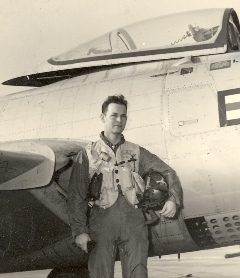SUGG-LOUIS
LOUIS HERBERT SUGG

LT

Home >> All, Global Policies, Goals, Gratitude, Optimism, Pathway 3 Meaning, Strengths, _2 Positive Traits
Remembering the Extraordinary Life of an Ordinary Person
By Kathryn Britton on May 28, 2007 - 12:27 pm 4 Comments
Kathryn Britton, MAPP '06, former software engineer, is a coach working with professionals to increase well-being, energy, and meaning (Theano Coaching LLC). She teaches positive workplace concepts at the
Lou Sugg, Pilot
Today is Memorial Day in the
Here's the opening to the essay he wrote for the second application:
To add political proficiency to military experience; to become familiar with other peoples, their problems and philosophies; to understand the ideals and practical bases for international organization by study and observation, to combine past achievement with future effort in preparing for an active role with the police force of the United Nations - this is my aim.
Here are some paragraphs from the middle where he expands his thinking:
Despite the necessity of spending much of my time in professional study, I have succeeded in developing a consciousness of liberal thought. I have learned a little about the political and philosophical developments of past centuries leading to man's present social instincts and shortcomings. My interest in the relations and problems of peoples and states has grown, and the development of international intercourse, including the organization and functioning of the United Nations, continues to absorb me. I have endeavored to keep abreast of current events by way of news sources. From all this has developed the embryo of a political thought and the realization of the necessity of continuing to develop that thought at Oxford if I am successful in this quest, by other means if necessary.
At
Here is the close, where he defines his guiding ideal.
The Charter of the United Nations provides for the establishment of a military force whose components shall be contributed by the members. It is my belief that ultimately there will exist a United Nations Police Force organized by the UN and responsible only to that organization. Such a force can be a mechanical instrument of enforcement or it may be a vital guiding influence on the relations of peoples. This latter is my ideal, and a constructive role with this force is my ultimate aim. This is my justification for seeking a Rhodes scholarship.
I asked Chris Peterson, co-creator of the Values-in-Action character strengths, to look at the entire essay and tell me what it said to him. Chris had been doing content analysis of Medal of Honor materials, so I knew he was interested in such writings. He wrote back:
What shows through here very clearly is perseverance and a host of humanity strengths not exactly named in the VIA but captured by generativity and breadth of moral circle.
Unfortunately, he couldn't resist an assignment after
<<

